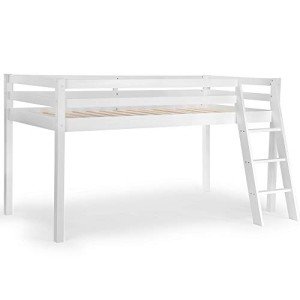Bunk Beds Sale: A Comprehensive Guide to Choosing the Right Bunk Bed for Your Home
Bunk beds have actually long been a staple in children's bedrooms, using a mix of space-saving efficiency and fun. Whether accommodating siblings, pals on sleepovers, or simply optimizing a playroom, bunk beds have ended up being a vital element in modern-day household homes. As sales on bunk beds increase, it ends up being increasingly important for customers to make informed choices when acquiring one. This article will cover the basics of buying a bunk bed, from types to safety features, as well as pointers for maintaining the stability of your investment.
Types of Bunk Beds
When considering a bunk bed sale, it's crucial to understand the different styles available on the marketplace. Below are the most common types:
- Traditional Bunk Beds: These consist of two beds stacked one above the other, sharing a single frame. They are typically the most affordable alternative.
- L-Shaped Bunk Beds: This design features one bed placed vertically and another horizontally. This arrangement creates additional space beneath the upper bed, which can be used for storage or a play area.
- Lofted Beds: Similar to traditional bunk beds but with no lower bed. Instead, the space underneath can be utilized for a desk, play location, or extra storage.
- Triple Bunk Beds: For families with a bigger number of kids or frequent slumber parties, triple bunk beds supply three sleeping areas in a space-efficient style.
- Futon Bunk Beds: These styles merge bunk beds and futon couches. The bottom area transforms into a different seating area, improving performance.
- Convertible Bunk Beds: These beds can be separated into 2 individual beds, making them versatile as kids's needs alter gradually.
Table 1: Comparison of Bunk Bed Types
| Type | Description | Space Efficiency | Additional Features |
|---|---|---|---|
| Standard Bunk Bed | 2 beds stacked vertically | High | Most basic style |
| L-Shaped Bunk Bed | One vertical and one horizontal bed | Moderate | Play or storage space |
| Lofted Bed | Raised bed with open space listed below | High | Work/play area |
| Triple Bunk Bed | Three stacked beds | Extremely High | Accommodates more users |
| Futon Bunk Bed | Bunk bed with a convertible futon | High | Multi-functional |
| Convertible Bunk Bed | Can be split into two different beds | Moderate | Flexibility & & durability |
Safety Features to Consider
Security is critical when buying a bunk bed. Below are crucial safety features to look for:
- Guardrails: Adequate guardrails need to exist on both sides of the upper bunk to avoid falls. They should be at least 5 inches greater than the mattress.
- Ladder Design: Look for durable, wide ladders with slip-resistant rungs. Make sure that the angle is not too high for easy access.
- Stability: Ensure the bed is constructed with strong materials, such as solid wood or heavy-duty metal. The bed must not wobble when in use.
- Weight Limit: Check the weight capacity of the bunk bed to ensure it can accommodate the designated users safely.
- Material Safety: If possible, select beds made from non-toxic materials or those fulfilling safety standards for kids's furnishings.
Table 2: Essential Safety Features
| Function | Description | Significance |
|---|---|---|
| Guardrails | Sides of upper bed to prevent falls | Necessary for child security |
| Ladder Design | Solid, slip-resistant rungs | Help safe and simple gain access to |
| Stability | Develop quality to prevent wobbling | Makes sure safety and durability |
| Weight Limit | Maximum weight capability | Avoids accidents |
| Product Safety | Non-toxic, safe products | Safeguards children's health |
Upkeep Tips for Bunk Beds
To extend the life of your bunk bed and make sure ongoing safety, think about the following upkeep ideas:
- Regular Inspections: Periodically inspect the structure for loose screws, bolts, or any indications of wear. Tighten fasteners as required.
- Clean Periodically: Dust and clean the surface areas routinely. Usage proper cleaners that will not damage the surface.
- Check Weight Limits: Be mindful of weight limitations, especially with older kids or adults who may wish to utilize the upper bunk.
- Prevent Climbing on Guardrails: Educate kids not to use guardrails for climbing or playing to lower the risk of accidents.
Often Asked Questions (FAQs)
Q1: What is the age limit for children to safely utilize bunk beds?A: While it varies by the maker, numerous suggest that kids under six ought to not sleep in the upper bunk due to safety concerns.
Q2: How can parents discourage unsafe climbing?A: Setting clear guidelines about bunk bed use and supervising kids can assist. Furthermore, utilizing a bed tent can prevent climbing up while developing a fun sleep environment.
Q3: What should I think about when decorating a room with bunk beds?A: Ensure there suffices space around the bunk bed for safe motion, and use the decor to create personalized spaces for each kid.
Q4: Is a lofted bed appropriate for older kids?A: Yes, lofted beds can be suitable for older kids as long as they meet security requirements and the child is responsible enough to utilize them securely.
Bunk beds serve a practical function while including a component of enjoyable to a kid's bedroom. As sales of bunk beds continue to rise, cautious consideration of types, safety functions, and maintenance practices is important for parents and caretakers. By understanding these crucial factors, families can discover the perfect bunk bed for their home, guaranteeing both functionality and security for years to come. Whether it's for brother or sisters sharing a space or developing a cozy pajama party space, a well-chosen bunk bed can supply happiness and functionality, making it a worthwhile investment.

